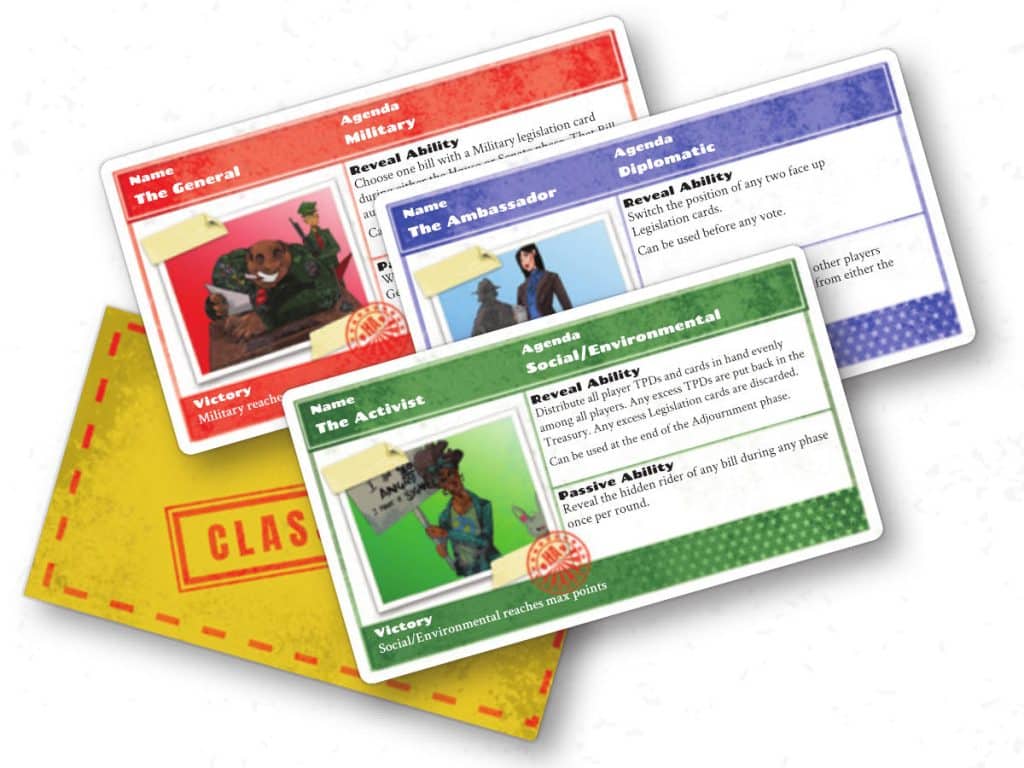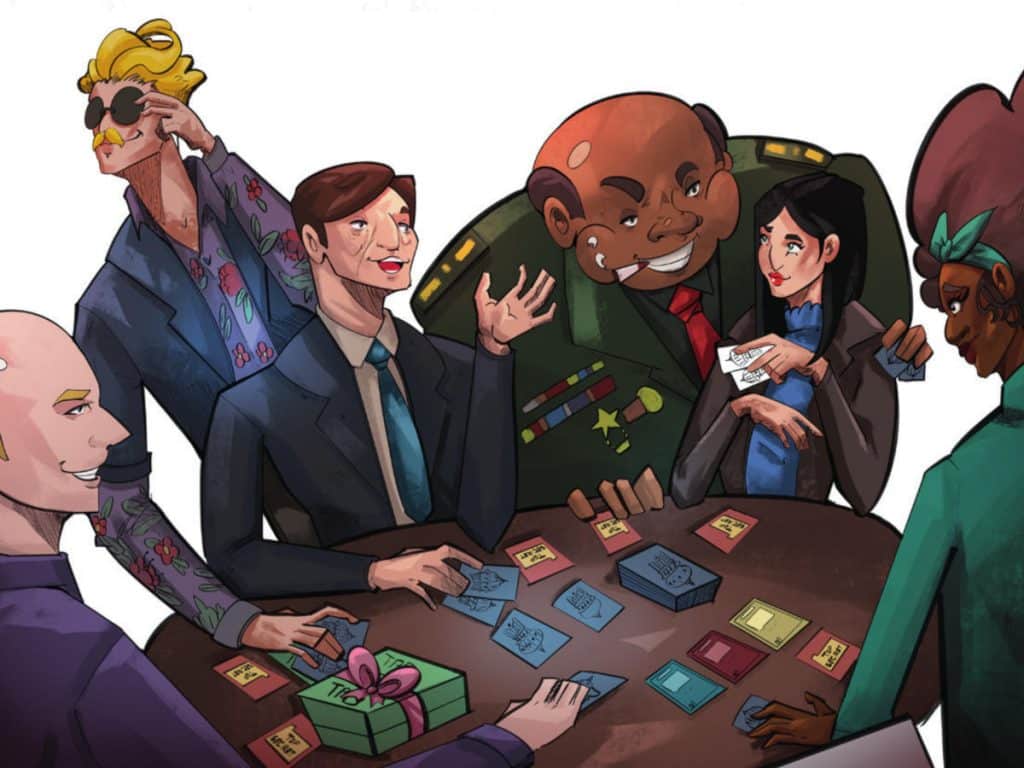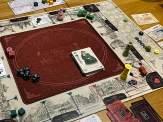| Release Date: 2016 | Players: 3-6 |
| Designer: Josh Rossman | Length: 60-90 minutes |
| Artist: n/a | Age: 12+ |
| Publisher: Big Boom Games | Complexity: 1.5 / 5 |
| Plastic (by weight): < 1% | Air (by volume): 50% |
We all had our different plans. Getting the right bills through the Senate was never easy. There would always be compromises and endless debates. We all wanted to further our own goals. The odd promise of a bribe, digging up dirt on the other parties’ representatives and some last-minute voting changes all helped to get what your party wanted. At the end of the day, we all had our own Hidden Agendas by Josh Rossman from Big Boom Games.
Listen to the Audio Version
Intro Music: Bomber (Sting) by Riot (https://www.
Sound Effects: bbc.co.uk – © copyright 2024 BBC
First Results by Blue Dot Sessions
Bluffing, Deception and Broken Promises
Hidden Agendas is a really simple game of bluffing and estimating what other players might be planning to further your own goal of getting a certain number of bills of a certain type voted through the Senate. It’s also a game that clearly doesn’t take itself too seriously, just as much as it takes the mickey out of politics. While everyone plays cards, that represent the various bills, it’s not a card game in the traditional sense. What Hidden Agendas achieves is an experience of heated, yet properly civilized debates, where promises are made as quickly as they are broken.
Every round players take turns and play one of their so-called legislation cards into one of the three possible bills. Each bill consists of three cards, two of which are played face up for everyone to see, while the third is played face down. Players can choose which of the available slots in the 3×3 grid they want to play their card and depending on player count, it’s very likely that some players will have added more of their cards to the bills, thereby having a greater influence on the game.
That’s already very fitting, because nothing is fair in politics. Hidden Agendas takes this further though. People are allowed to offer money in return for promises that another player takes a certain course of action. However, agreements aren’t binding, but if someone does break their promise, they will be fined half of the money they have left. You can also spend your money to force other players to take certain actions or otherwise influence what bills get passed and which ones don’t.

Primary Colours
Once the three bills have been played, it’s time to debate which of them is removed. Everyone tries to convince the other players of which one shouldn’t pass, based on their goal. Most players will need to pass the most bills of a specific colour, such as red for military or green for social and environmental legislation. There is also the party leader, who is assigned a colour at random and the opposition leader, who has the goal of stopping the party leader.
So it is possible that two or more players win Hidden Agendas. For example, when the party leader wins, the player whose goal is the same colour also wins. If the party leader loses, then the opposition leader will win alongside the player or players with the most bills of their colour. I guess it’s like forming a coalition and I quite like that multiple players can win together.
Everyone’s goals are hidden, so you need to be careful not to reveal your plans too early. Otherwise, the other players will try and stop you. At the same time, you want to influence everyone else’s votes. You might try a double-bluff or you might argue for a bill that you don’t really care about. There are plenty of options.
Once the debate is over, everyone votes and the bill with the most votes is out. The Speaker, which is the player whose turn it is, has the deciding vote. The three cards are put on the discard pile and it’s time to vote on which of the remaining two bills goes through. So there is another debate step before everyone casts their final vote. The winning three cards are added to the scoring area and the other three discarded.

Public Speaking
Now, I am not a fan of debating games. Trying to convince other players of my cause, especially in character, doesn’t come naturally to me. However, Hidden Agendas makes it easy. The legislation cards that form the bills all have strange or comical names. Arguing that everyone should vote against a billionaire space station is pretty easy and fun for example.
So if you don’t usually like social deduction games where you have to defend yourself or argue against another player, you should be fine with Hidden Agendas. I certainly started to get into it very quickly and felt very comfortable arguing against or in favour of certain bills in front of the group. Of course, your mileage will vary and it’ll probably feel different when playing with friends or family versus strangers. However, I certainly can attest that the game wants to make the debate steps as easy and fun as possible. If you really don’t get on with it though, you can easily skip them and go straight to voting instead.
So, overall, Hidden Agendas is a really fun bluffing game. Having one face-down card in every bill that only the person who played it will know what it is, unless you spent money to be allowed to peek at it, creates a real twist. Even when the other players have worked out what your role is, you can still double-bluff and win the game. In fact, every role has a so-called reveal action. You can reveal your goal to the group and then get an advantage specific to you, which can be really powerful.
Anyway, as you can tell, I recommend you give Hidden Agendas a chance. It certainly has my vote!
For behind-the-scenes updates, branded merchandise, and more, please support the blog.
Useful Links
- Hidden Agendas: https://bigboomgamesllc.
com/ collections/ all - Kickstarter page: https://www.
kickstarter. com/ projects/ bigboomgamesllc/ hidden-agendastm - Big Boom Games: https://bigboomgamesllc.
com/ - BGG listing: https://boardgamegeek.
com/ boardgame/ 419554/ hidden-agendas
Videos
Transparency Facts
I feel that this review reflects my own, independent and honest opinion, but the facts below allow you to decide whether you think that I was influenced in any way. Please also read my Ethics Statement for more information.- I was given a free review copy of this game by the publisher.
- At the time of writing, I have not received financial support from the publisher or anyone working on their behalf.
Audio Version
Intro Music: Bomber (Sting) by Riot (https://www.
Sound Effects: bbc.co.uk – © copyright 2024 BBC
First Results by Blue Dot Sessions
Playlist
These are the songs I listened to while I was writing this review:







Thanks, Oliver for that great review!
This game is now live on Kickstarter. If the review piqued your interest, please consider backing our project.
https://www.kickstarter.com/projects/bigboomgamesllc/hidden-agendastm?ref=user_menu
Hello Josh. Thank you for your comment. I’m glad you enjoyed the review. I’ve now added the Kickstarter link to the review as well.